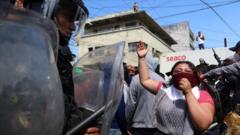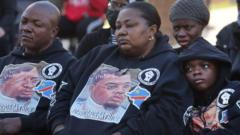In the wake of public backlash and protests, the Guatemalan government has suspended its recent decree mandating compulsory car insurance for all vehicle owners.
Guatemala Repeals Compulsory Car Insurance After Public Unrest

Guatemala Repeals Compulsory Car Insurance After Public Unrest
Guatemalan President responds to protests by retracting mandatory car insurance law
Following two days of intense demonstrations, President Bernardo Arévalo announced that the plan for mandatory insurance would be scrapped. This regulation was designed to ensure that drivers could compensate victims in case of traffic accidents, a significant issue in Guatemala, where over half the population lives in poverty and struggles to afford additional expenses.
The protests prompted thousands to take to the streets, blocking major roads and clashing with law enforcement as dissatisfaction grew following the announcement made earlier this week. The decree had been brought forward after a tragic bus accident that claimed over 50 lives last month, underscoring the need for increased accountability on the roads.
During a press briefing, President Arévalo acknowledged the complexity of implementing necessary reforms for improved public safety, citing traffic accidents as a leading cause of mortality in the nation. He expressed his commitment to create a new general transport law while announcing a partnership with protest leaders to establish a committee focused on finding a feasible way to introduce compulsory insurance in the future, within a year. A key complaint from the protestors was that the costs associated with the insurance had not been made clear ahead of the measure’s start date. The road blockades significantly disrupted the capital, leading to school closures and business interruptions, as citizens rallied against the sudden imposition of the law.
The protests prompted thousands to take to the streets, blocking major roads and clashing with law enforcement as dissatisfaction grew following the announcement made earlier this week. The decree had been brought forward after a tragic bus accident that claimed over 50 lives last month, underscoring the need for increased accountability on the roads.
During a press briefing, President Arévalo acknowledged the complexity of implementing necessary reforms for improved public safety, citing traffic accidents as a leading cause of mortality in the nation. He expressed his commitment to create a new general transport law while announcing a partnership with protest leaders to establish a committee focused on finding a feasible way to introduce compulsory insurance in the future, within a year. A key complaint from the protestors was that the costs associated with the insurance had not been made clear ahead of the measure’s start date. The road blockades significantly disrupted the capital, leading to school closures and business interruptions, as citizens rallied against the sudden imposition of the law.



















